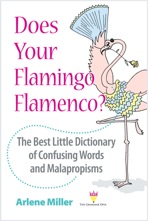 I always rewrite the very beginning of a novel. I rewrite the beginning as I write the ending, so I may spend part of morning writing the ending, the last 100 pages approximately, and then part of the morning revising the beginning. So the style of the novel has a consistency. Joyce Carol Oates
I always rewrite the very beginning of a novel. I rewrite the beginning as I write the ending, so I may spend part of morning writing the ending, the last 100 pages approximately, and then part of the morning revising the beginning. So the style of the novel has a consistency. Joyce Carol Oates
One thing that copyeditors look for when editing a manuscript is consistency. Why? Consistency makes your book (or whatever you are writing) look pulled together–and as if you know what you are doing. What do I mean by consistency?
I was copyediting a book a couple of weeks ago. In one sentence the writer used the Oxford (series) comma. In the very next sentence, which also contained a series, the author didn’t use the Oxford comma. Although I prefer using the Oxford comma, it is really the author’s choice, so I will just go with whatever the author uses for the first series I see. I will make the rest of the series the same: either comma or not. Yes, there is of course an exception: if a series is confusing, I will add or delete the Oxford comma regardless of how the other series are done. I really don’t understand why a writer would choose to use the comma in one sentence and not in the next. Maybe the author isn’t thinking of commas as much as I am! Here is an example:
I have so many things to do today. I need to go to the bank, pick up the kids from school, get to the library before it closes, and definitely get to the grocery store. We are completely out of bread, eggs, milk and several other necessities.
Here are three other important things (in my opinion) to keep consistent:
- Hyphens. Some compound words are hyphenated. Others are written as two separate words. Yet others are run together as one word. Sometimes a word changes over time. Take the word web site. Or is it web-site? Or website? Well, we can probably agree that it is website. However, website is a relatively new word in our language. It often happens that a new word begins as two separate words, and as it becomes more common, it becomes hyphenated, and then as it becomes everyday language, it is written as just one word. I see e-mail and email, e-book and ebook. Does it matter which way you write it? Then there are the compound modifiers: one-term senator, two-story building, etc. Most of the time you can’t find a compound modifier in a dictionary. And words like e-mail might be hyphenated in one dictionary and written as one word in another. What to do? What to do? Pick a way to write it, and stick with it. It is better to pick a way–even if it isn’t the preferred way — and stick to it than to keep changing from one way to another. Being inconsistent gives the appearance you really don’t know what you are doing. Consistency gives the appearance of a plan.
- Capitalization. We all know the capitalization rules. And there are so many of them. And sometimes, there just is no real answer as to whether or not something should be initial capped or not. Or maybe you have some reason to capitalize something just because. Be consistent with the capitalization. Pick one way and stick to it for the same use of the same word. Inconsistent capitalization can be jolting to a careful reader.
- Parallel construction. What is that? It is more of a grammatical/writing quality issue that is a more organic type of consistency. It is actually “incorrect” to write without parallel construction. Parallel construction is the use of the same construction for similar elements in a sentence. Here is a very simple example of a sentence that is NOT parallel: We went to the pool, to the mall, and saw a movie. Parallel: We went to the pool, to the mall, and to the movies. A little more complex example of a sentence that is not parallel: My boss said, “You will be getting a promotion, receiving a sizable raise, and your responsibility will increase.” Here is how to write it in a parallel way: My boss said, “You will be getting a promotion, receiving a sizable raise, and assuming more responsibility.”
Consistency is one of those aspects of your writing that make it look “finished.”
Grammar Diva News
Don’t miss the Sonoma County Fair if you are local! Redwood Writers will be selling books, giving readings, and providing you with tips of all kinds every day of the fair in the EC Kraft Building. I will be there with my books — at special prices, of course– on Saturday, August 5; Friday, August 11; and Sunday, August 13 from 11 a.m. to 6 p.m. Please come by and say Hello!!!
My new book is now available on Amazon. It is also now available for preorder on Kindle right here!
Is it buck naked or butt naked? Lay or lie? Compliment or complement? You will find over 250 confused word pairs, word groups, and idioms, presented alphabetically with examples and definitions.




Thanks for this and other great posts, Arlene!
My question is slightly off-topic – it’s to do with articles.
In high-school, teachers told us be extra careful with articles. So we wrote sentences like: “YouTube is a part of Google.”
These days, I see a lot of established writers do away with that ‘a’: for instance in the book “How Google Works” I have seen more than sentences like “DARPA is part of the US Department of Defence.” No ‘a’ 🙂
Could you please help? Many thanks in advance
Good question. I don’t really know. Does anyone reading this? articles and prepositions are two things that baffle those trying to learn English. There is no rule. Sometimes, with some words, we leave out the articles. I don’t think it is “correct” or “incorrect.” Just baffling!And often there is a different between British and American English in the use of articles as well.
This is one of my favorite topics. Several years ago I put together a Style Guide for an entire school district. I had a blast doing it, and it made communications from the district appear so much more consistent. Sometimes I need a little help in making a decision, so one of my favorite websites is One Look Dictionary. There you find out how many dictionaries spell a word one way verses another, how many hyphenate, how many don’t. If I haven’t already made a decision or it’s a new word for me, this is my first stop. If there is a big discrepancy, I’ll follow the leader.
Personally, I love the Oxford comma and always use it. It is a lot easier to keep my executives on track with their emails by just telling them to use it. Many try to not use it all the time, which makes their emails confusing half the time. If I can get them to use that extra little comma, their emails and other writings tend to be much more accurate, and I don’t have to keep explaining why “this time” skipping the comma is wrong. I love the t-shirt that say’s “Let’s eat Grandma. Let’s eat, Grandma. Why commas count.”
Thanks for another great topic, Arlene.
Thanks for the comment and the reference to the One Look Dictionary, which I am unfamiliar with. (But no longer!) Thank you for having your executives use the Oxford comma; I am obviously a big fan of the comma and think it does generally make things clearer.
I also use Onelook.com all the time; it’s very useful. But I’m a copyeditor and proofreader, so I have to say: no apostrophe in “says” before the quotation. ” I love the t-shirt that says “Let’s eat Grandma. Let’s eat, Grandma. Why commas count.”
Sorry: I’m just that OCD about this stuff!
Thanks for the comment. I don’t quite understand the apostrophe in says????
I love your posts! They reinforce the rules I learned in school some 42 years ago and help me with the ones I remembered incorrectly, as well as prove I have more to learn. However, in your presentation about hyphens, near the end, the set-off phrase has a closed en dash to begin and an open em dash to end. I’m sure I erred more than once in this message, so I’m not proclaiming any superiority on my part.
Thanks for the compliment; glad you enjoy the posts. And thanks for noticing my slip-up. I will fix it! I didn’t catch any errors in your comment!
Arlene,
You and I are definitely on the same wave length. My latest book, AMERICAN-ENGLISH, is all about the inconsistency of so many “rules” and the need for every writer to create their own Style Manual. Why should any writer need somebody else’s style manual (i.e., NY Times, Wall Street Journal, AP, Chicago University…) and certainly not the Oxford SM (unless you’re writing words in British-English)? It’s so easy to create your own: either open a MY STYLE MANUAL file on the computer or grab a yellow pad and begin to keep track of every decision you make about word/punctuation usage. Arlene, I love your writing tips to writers — our best readers.
Thanks for the comment! When I copyedit, I always jot down questionable words and what I have done with them hyphenation and capitalization-wise. I generally send along this style sheet to the author when I am done with the edit. You really can’t get that information in any of the standard style manuals.
Why isn’t everything in the world as clear as your explanations? Maybe it takes a little effort.
Thank you for that compliment! I really appreciate it!
Ralph Waldo Emerson said that consistency is the hobgoblin of little minds, but as a copyeditor, consistency is vitally important to a well-written manuscript.
Ha! I know that quote…and when I was looking at quotes to find one (a positive one) about consistency, I saw lots of quotes that resembled Emerson’s. But you are right; it’s important for good writing!
I love these columns! I’m no expert on Emerson (we don’t usually study him at high school here in England) but I don’t think that his comment about consistency was particularly about grammar or writing style. Consistency is indeed important in good writing, but always remember what Orwell said straight after his first five rules for good writing – “break any of these rules sooner than say anything outright barbarous.” An example: I was taught to avoid the Oxford (Harvard?!) comma and so I generally don’t use it. But if I wrote three “series” sentences without it and then up came a fourth in the same piece where omitting it rendered the sentence ambiguous I wouldn’t hesitate to use it, because clear meaning and (in my view) elegance should always trump consistency.
Thank you! Glad you enjoy the blog posts. I agree with you and Orwell! The sentences I was editing would have been fine either with or without the Oxford comma, so in that case I would recommend being consistent.
Fantastic! Just following these few guides for consistency in punctuation use, capitalization, and parallel construction makes a writer so much more readable! You’ve hit my most heartfelt issues with writing! Thank you, Arlene!
Glad you liked it!